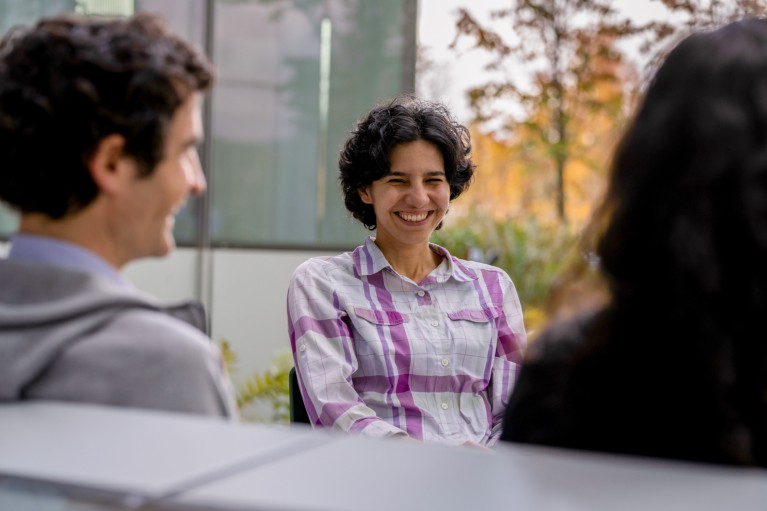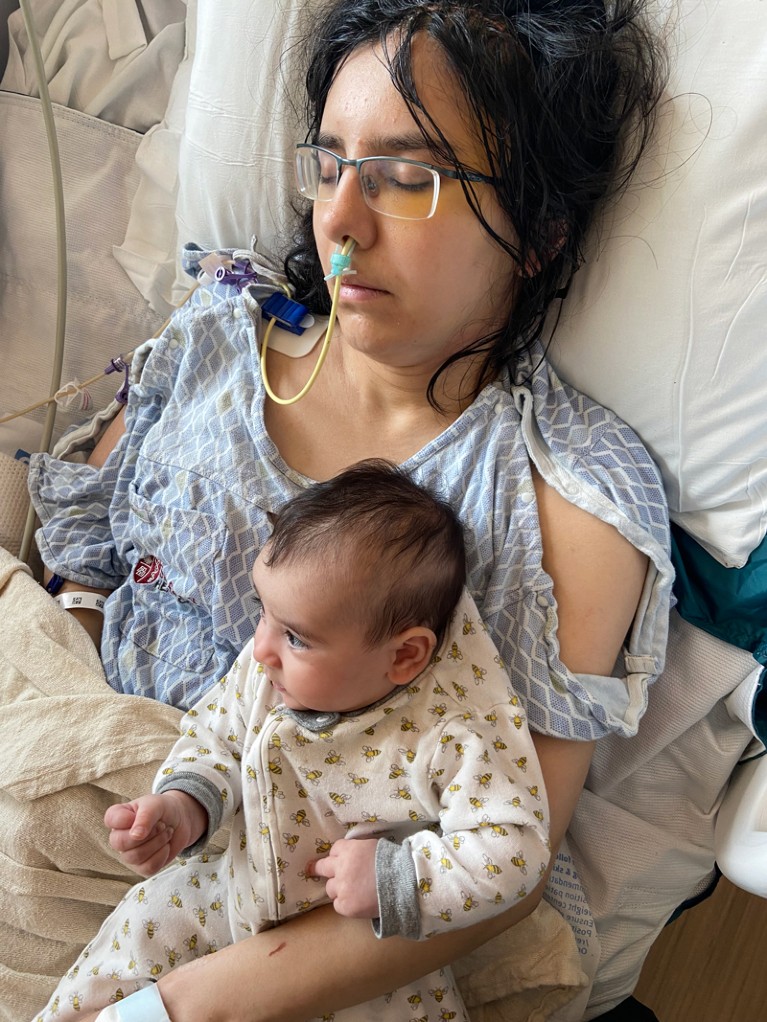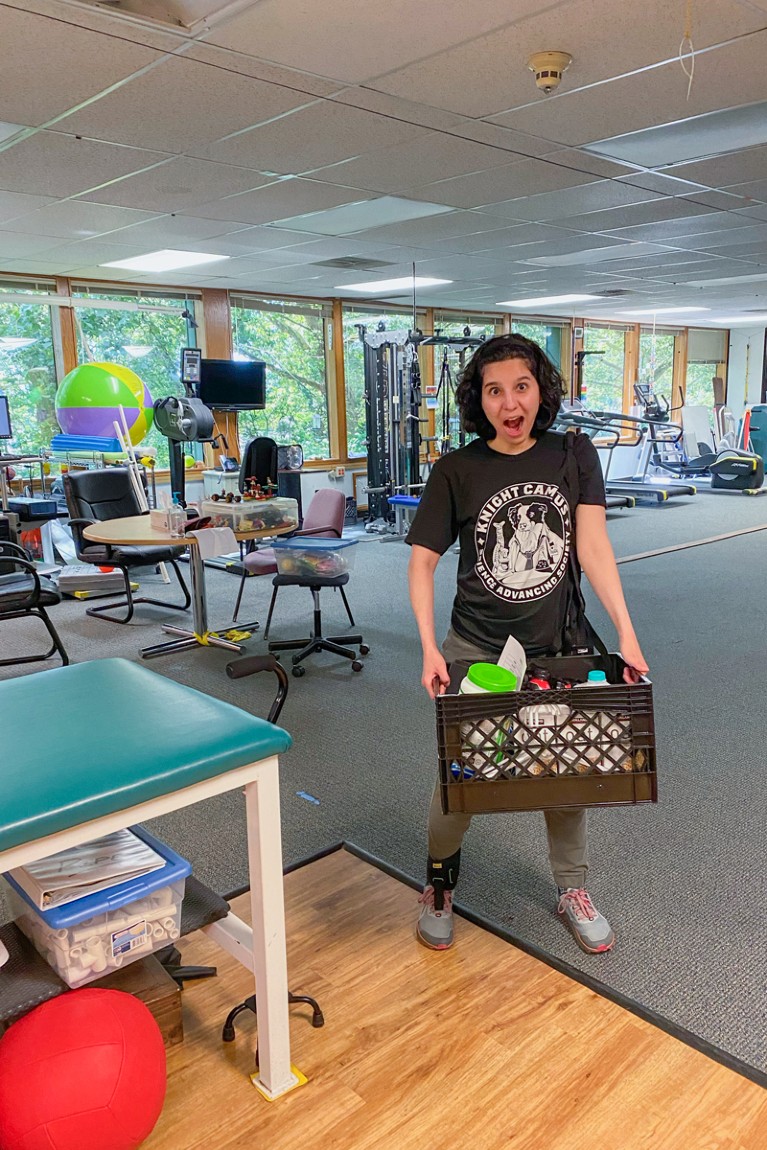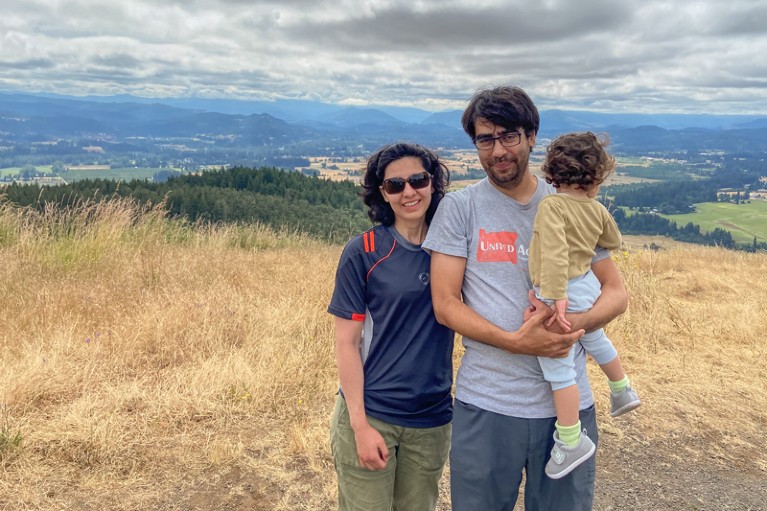
Before experiencing a brain haemorrhage in 2022, Parisa Hosseinzadeh was on the tenure track and managing a successful lab.Credit: University of Oregon
I was eight months pregnant and doing my daily yoga in November 2022, when I developed a severe headache. My husband Amir called the emergency services, but I soon lost consciousness.
Turns out, I had a brain bleed. I was transferred from the local emergency department in Eugene, Oregon, to a neurological intensive-care unit in Portland, about 175 kilometres north of my home. That night, the surgeons drilled a hole in my skull and inserted a tube to relieve the pressure. I ended up spending a month there, which ended when my baby was born through a caesarean section.
My baby was healthy, beautiful and full of joy, and two weeks later we returned home. But my medical issues were far from over.
Before that November day, I had begun my third year as an assistant professor in the bioengineering department at the University of Oregon in Eugene, studying the de novo design of enzymes and peptides. I led a small but thriving research group with a laboratory manager, three postdocs, three graduate students and several undergraduates, and we had a trio of successful grant applications. Today, I work two days a week and attend physical, occupational and speech therapy on the other three days. But with the support of my family, my health-care team and my colleagues, I am slowly getting back on track.
The long road to recovery
After my initial emergency surgery, the doctors diagnosed me with arteriovenous malformations, an abnormal growth of blood vessels in the brain that makes them prone to rupturing. I needed further surgery, but that could happen only after my baby was born.
The operation was scheduled for 14 March at Stanford Medical Center in California. But what should have been a relatively low-risk procedure turned out to be much more complicated. I experienced several strokes that left me with deficits in my motor function and speech. The surgeons had to sacrifice a major blood vessel in my brain to save my life.

Hosseinzadeh went through several surgeries and intensive physical, occupational and speech therapy after her injury.Credit: Amir Nayerri
Ten days later, I was transferred to an inpatient rehabilitation centre in California, where I spent another four weeks. My condition was extremely poor: I had difficulty swallowing and little movement on my right side, and I was largely unable to communicate in either English or my first language, Farsi. But with the help of my husband and dedicated therapists, I saw considerable improvement. After four weeks, I was still mostly using a wheelchair to get around, but could use a walker to walk slowly and for short periods — with assistance from others — and I could speak in short sentences, although I couldn’t always express what I wanted to convey.
From there, I moved to an intensive outpatient centre in Portland, where I had therapy seven hours a day, five days a week. Eventually, this schedule was reduced to three days a week, which I plan to further reduce to a few hours a week in an outpatient setting in Eugene. I made progress every day: I got rid of my wheelchair after two weeks in Portland, and the walker after five. I am still learning to walk ‘normally’, but in April, I completed a 5-kilometre race, running all but one minute of it.
Still, major challenges remain. I am right-handed, but because I lost the power in my right hand, I have had to train my left hand to do everything — typing, cooking, holding my baby and changing her clothes. I also lost much of the peripheral vision in my right eye, and the only way I can compensate is through more neck and eye movement.
Recovering my speaking ability has been a hard journey, too. I had a difficult time reading to my baby, even six months after the stroke. I can read now, but much more slowly than before. I just finished reading my first adult book since the stroke, The Midnight Library (2020) by Matt Haig, and I have submitted my first funding proposal since my injury.
Writing that proposal brought more challenges. For one, I had to learn to write with my left hand. I couldn’t use voice-recognition software, because I was still sometimes having difficulty speaking in English. And at first, I could work for only 15 minutes at a time. The artificial-intelligence chatbot ChatGPT helped, but it did struggle to grasp scientific concepts and formulate phrases accurately. Still, with the help of my husband, a speech-language therapist and an assistant from the university, I managed to submit the proposal. It was a win, but for me, it was more important was that my writing and my ability to be a scientist seemed to be improving.

Hosseinzadeh holds up a crate during a physical-therapy session.Credit: Amir Nayerri
My speech is also improving rapidly, but it’s sometimes still difficult to find the words that I need, especially when I am tired. Writing this article is a prime example. At first, the process was very slow, and each editorial question seemed to take forever to answer. My husband had to read and edit what I had written. But my condition has improved, and now I can read through the text without pausing. I’m not fast, but I don’t need to stop after each question. To me, that’s remarkable.
A supportive environment
I am fortunate to have an academic position in a supportive department and a reasonably generous health-care plan. I was absent for nine months, yet I was still paid — and I got to keep my health-care benefits. The department chair stayed in touch and offered significant support to my family, including visiting me at home, arranging faculty gatherings and just being there when I was in need. She also helped to keep my lab operating. I am very lucky to have a capable lab manager and a postdoc who did everything they could to ensure that our lab kept running — in fact, my lab manager received an award from the department for her efforts.
After my nine-month absence, the university continued to support me by arranging for me to work one day a week during my first academic quarter back. I am now working two days a week, and the plan is to increase gradually to a full-time schedule. In terms of mentoring, research and teaching, my main issue is that I am not as fast at communicating as I used to be, and it sometimes takes a while to find the right words.
Had my career progressed normally, this year I would be giving a talk for my mid-tenure review, but I asked the department to delay my tenure clock by one year. We plan to re-evaluate later this year to see whether I’ll be ready to restart the clock next February.
Top tips
My experience is, of course, unique. But there are lessons that others can take when facing an unexpected and protracted career disruption owing to an injury.
First, having supportive family and friends is crucial: they give you emotional support and a reason to fight. I do not know what I would have done without my husband — not to mention our newborn, parents, sisters and friends. Use the emotional support to become stronger.

After making huge improvements during her recovery, Hosseinzadeh can now go on hikes with her family. Credit: Amir Nayerri
Second, many people who experience a brain injury get better, but the process can be slow and frustrating. The day-to-day improvement often seems insubstantial, but over time, things can change dramatically, and it’s good to know that there is hope. Learning about people who have fully recovered can be inspiring.
Third, persistence in therapy is crucial when it comes to brain injury. I was lucky in that I’m naturally stubborn, so I didn’t give up early on despite the difficulty and frustration. If a family member or friend in need starts to give up, you need to be at their side to encourage them.
Finally, although nobody wants to think about medical emergencies, it’s wise to build up a financial cushion so that you have more options when it comes to therapies, if needed. Having good insurance helps, but there are other expenses, such as travel. I was lucky that my department continued paying me, but I have seen others in similar situations face financial struggles.
A year and a half after falling ill, I feel excited and ready to work. Is it hard? Yes. It’s even harder with a nearly two-year-old daughter who is full of energy. Do I sometimes think it might not happen? Yes. But, with my friends, family and colleagues, we have come this far, and we will finish strong. And strong means trying our best, regardless of what we achieve.

